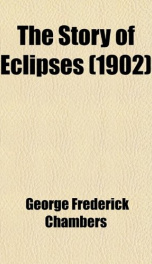The Story of Eclipses

Purchase of this book includes free trial access to www.million-books.com where you can read more than a million books for free. This is an OCR edition with typos. Excerpt from book: CHAPTER VIII. ECLIPSES OF THE SUN MENTIONED IN HIS- TORYCHINESE. This is the first of several chapters which will be devoted to historical eclipses. Of course the total eclipse of the Sun of August 9, 1896, observed in Norway and elsewhere, is, in a certain sense, an eclipse mentioned in history, but that is not what is intended by the title prefixed to these chapters. By the term " historical eclipses," as used here, I mean eclipses which have been recorded by ancient historians and chroniclers who were not necessarily astronomers, and who wrote before the invention of the telescope. The date of this may be conveniently taken as a dividing line, so that I shall deal chiefly with eclipses which occurred before, say, the year 1600. There is another reason why some such date as this is a 'suitable one from which to take a new departure. Without at all avowing that superstition ceased on the Earth in the year 1600 (for there is far too large a residuum still available now, 300 years later), it may yet be said that the Revival of Letters did do a good deal to divest celestial phenomena of those alarming and panic-causing attributes which undoubtedly attached to them during the earlier ages of the world and during the " Dark Ages" in Western Europe quite as much as during any other period of the world's history. No one can examine the writings of the ancient Greek and Roman historians, and the chronicles kept in the monasteries of Western Europe by their monkish occupiers, without being struck by the influence of terrror which such events as eclipses of the Sun and Moon and such celestial visitors as Comets and Shooting Stars exercised far and wide. And this influence overspread, not only the unlettered lower orders, but many of those in far higher stations of life who, one...
Info about the book
Author:
Series:
Unknown
ASIN:
B0082QWXGS
Rating:
3.5/5 (3)Your rating:
0/5
Languge:
English
Users who have this book
Users who want this book
What readers are saying
What do you think? Write your own comment on this book!
write a commentGenre
if you like The Story of Eclipses try:
Other books by this author
Do you want to read a book that interests you? It’s EASY!
Create an account and send a request for reading to other users on the Webpage of the book!

